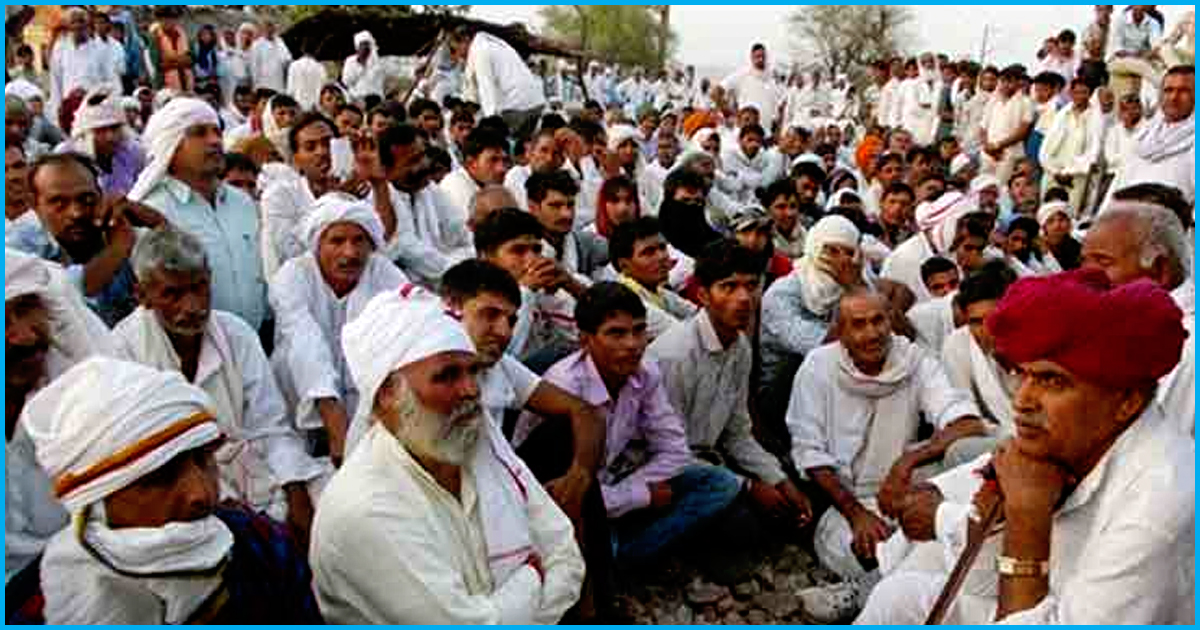
Rajasthan Govt Introduces 5% Quota In Jobs For Protesting Gujjars; All You Need To know About It
13 Feb 2019 10:40 AM GMT
Today, the Rajasthan govt led by Ashok Gehlot introduced a bill in the legislative assembly granting 5% quota in jobs and educational institutes to Gujjars, and four other communities. In Rajasthan, the Gujjar community along with four other communities is in its sixth day of agitation demanding 5 per cent reservation in government jobs and educational institutes and is yet to call off the protest.
“There is unrest in the state and the country. The chief minister is serious about the issue,” Jitendra Singh, a Rajasthan lawmaker told NDTV.
On Monday, February 11, the protesters had blocked National Highway-11, which connects Jaipur with Agra. Railway lines were also blocked by the protestors. Due to the agitation, at least four trains were diverted, and one was cancelled yesterday. The agitation that began on February 8, Friday, has affected more than 250 trains so far, reported The Indian Express. On Sunday, February 10, the ongoing protests turned violent. According to the police, protesters pelted stones and torched three police vehicles. The police added that to disperse the crowd, they had to use tear gas shells.
This is not the first time that the Gujjar community is holding a protest for the demand of five per cent quota. So the question is why is the community have been protesting? The Logical Indian explains the history of the Gujjar protest.
What is their demand?
Gujjar traditionally comes from the pastoral community. Gujjars are present in several parts of the country including Rajasthan, Madhya Pradesh, Haryana and many more. Gujjars constitute about 7% of Rajasthan’s population. They are present in and around 21 Rajasthan districts, and they are believed to be BJP party supporters.
Till 1994, the Gujjars were under the OBC category, but in 2006, they started to demand their inclusion in the Scheduled Tribe (ST) reservation. However, the Chopra Committee report in its 209-page long report to the then Rajasthan Chief Minister Vasundhara Raje said that Gujjars could not be given ST status. But it did recommend an incentive package pertaining to jobs, reservations in academic institutions and scholarships to the community members.
In 2008, the Raje government then introduced a bill giving 5% Special Backwards Class (SBC) reservation to Gujjars and four other communities. However, in December 2010, the Rajasthan HC stayed the law and sought data from the Rajasthan Government on why the Gujjars should be given reservation under the SBC category.
Later, the reservation under SBC category to Gujjars was completely quashed by the Rajasthan high court on the grounds that it is beyond the 50% reservation-cap for every state, which was set by the Supreme Court.
During this time many protests kept happening in Rajasthan demanding reservation. In 2012, the new Ashok Gehlot government offered the same 5% reservation to the community, but it was also squashed by the HC for the same reason. Currently, the state has 50% reservation – 16% to SC, 12% to ST, 21% to OBC and 1% to Gujjars.
Is this the first time Gujjars have blocked train & traffic?
In Rajasthan, the Gujjar community have held a series of protests. The protests in 2008, had turned violent in the state. According to the reports, police fired on protesters which resulted in the protest getting out of the police’s hand. In retaliation, the protesters lynched a policeman in the Bharatpur district of Rajasthan and vandalised public property including police vans. At least 30 were killed during the protests. On 24 May 2008, the Rajasthan government had to take the help of the Indian army to take control of the situation.
Thousands of protesters blocked a rail route between Delhi and Mumbai. Highways had also been blocked, and state authorities cancelled many buses. In 2010, there were also some protests by community members, however, no violence was reported then. In May 2015, a similar protest was organized and over thousands of Gujjars blocked railway tracks halting train traffic.
The Gujjar community leader, Colonel (retd) Kirori Singh Bainsla has been leading the community since 2006.
Also Read: Rajasthan: Demanding 5% Reservation, Protesters From Gujjar Community Block Railway Tracks
 All section
All section













